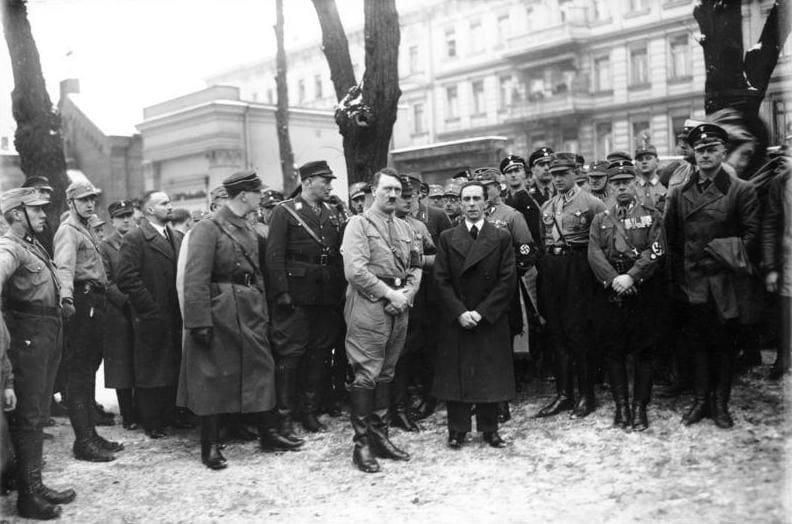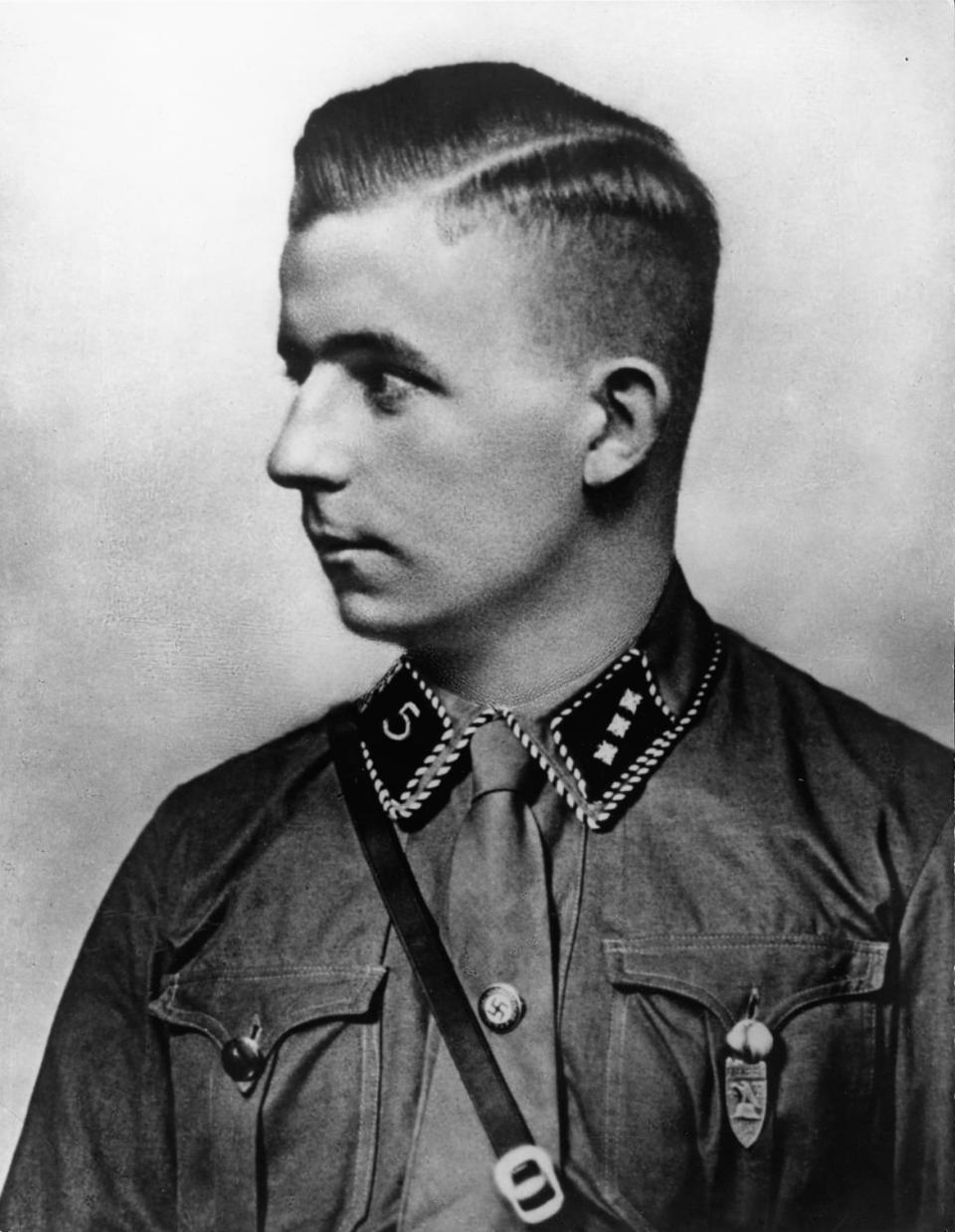Trump’s Age-Old Script for Making a Martyr of Ashli Babbitt

- Oops!Something went wrong.Please try again later.
- Oops!Something went wrong.Please try again later.
- Oops!Something went wrong.Please try again later.
- Oops!Something went wrong.Please try again later.
On Jan. 6, Ashli Babbitt, a 35-year-old Air Force veteran, was shot and killed during the insurrection while trying to climb through a broken glass door in the Speaker’s lobby. She was part of the violent mob bent on stopping the peaceful transfer of power and, ostensibly, trying to harm or kill political leaders like Mike Pence and Nancy Pelosi before they could certify Joe Biden’s campaign win in defiance of Donald Trump’s (ongoing) Big Lie. Trump defenders have tried out various rationalizations for the attack on the Capitol Building (It was an antifa false flag! It was just a picnic!) but seem to have settled on flipping the script and playing the victim. For this to be true, Babbitt must be a martyr.
It matters little that Babbitt was not the “innocent, wonderful, incredible woman” that Trump claims she was. From Trump’s public comments, it appears that all he knows about Babbitt—who appears to have been caught up in QAnon conspiracy theories regarding his Big Lie—is that she was part of the group rampaging through the Capitol on his behalf.
This is a very old script, which is why historians are comparing the story Trump is telling now about Babbitt to one from nine decades back about Horst Wessel, the famed Nazi “martyr.”
A marching song - 'Die Fahne Hoch' - was named 'Horst-Wessel-Lied', or 'The Horst Wessel Song' and sung by SA units, as well as the Hitler Jugend and BDM (Bund Deutscher Madel) throughout the time of Nazi rule. /9 pic.twitter.com/ZF95WcGWfQ
— Mike Stuchbery 💀🍷 (@MikeStuchbery_) August 31, 2020
According to historian David Pietrusza’s 1932, Wessel, the son of a Lutheran minister, was “primarily a street fighter” for the Nazis in their Weimar-era battles with Communists. He had “taken a live-in girlfriend” who was a prostitute. And he was just 22 when he was killed in a fight after his landlord asked her Communist friends to help evict them. He was no saint (some think he was a pimp), and he was not murdered in service to his cause. “This was neighbors against him, rather than political enemies,” Peter Fritzsche, a University of Illinois professor and author of Hitler’s First Hundred Days, tells me.
As far as the Nazis were concerned, Wessel was more useful dead than he had been alive. He would be celebrated after his death in 1930 as a fallen hero. Just after taking power in 1933, thousands of SS members led by Chancellor Adolf Hitler himself marched by the Communist Party’s headquarters before the new chancellor spoke at Wessel’s grave as a monument was placed there, praising the street-fighter as a “blood witness” who’d sacrificed his life for “a monument more lasting than stone and bronze.”

Before dying, Wessel composed what later became a wildly popular fighting song in his honor (“Raise the flag! The ranks tightly closed! The SA marches with calm, steady step”) that the Nazis made a national symbol upon taking power and later a co-national anthem.
“(Wessel) was clearly a political talent in the making,” says Daniel Siemens, professor of European history at Newcastle University and the author of The Making of a Nazi Hero: The Murder and Myth of Horst Wessel, “but yeah, he was best and most useful to the party because he was dead.”
Of course, the right doesn’t have a monopoly on sanctifying the dead, whatever their failings in life, to advance their cause. Heck, we live in a world where it is fashionable for socially conscious young Americans to wear T-shirts with the iconic face of Che Guevara. Image is everything.
And the fight over Babbitt’s image is ongoing. It does not escape me that I am writing this column in Charles Town, West Virginia, midway between where John Brown’s raid took place in Harpers Ferry and where he was hanged in downtown Charles Town. Brown has been described as an abolitionist hero and a domestic terrorist, a formulation that was perversely echoed in a recent CNN headline on Babbitt declaring that “To some, she’s a patriot. To others, a domestic terrorist.”
“If the Trumpists manage to stage [Babbitt] as a model that is deeply kind of rooted in American values and life,” says Siemens, “her own doings wouldn’t matter so much because she would just become a symbol of something.”
The liberals in the Weimar Republic, Siemens believes, made the mistake of focusing on debunking Nazi lies about martyrs like Wessel, as opposed to creating their own romantic symbols.

“If you want to defeat this heroization of [Babbitt], don’t argue about her,” he advises, “just make sure there is a larger story to be told."
Siemens also compared America’s current partisan and siloed news coverage to the Nazi era. “You have to destroy the idea that there’s truth," Siemens said. "The Nazis did exactly that." In the absence of objective reality, perception is what matters.
Why Trump Is Anointing Ashli Babbitt as MAGA’s First Martyr
“The blood of the martyrs is the seed of the church,” according to early Christian author Tertullian. This is a philosophically neutral truism. And if martyrs are inherently helpful, then manufacturing them is a logical next step. According to Pietrusza, “Goebbels (once a devout Catholic and perhaps even bound for the priesthood) grasped the immense value of any cult of martyrology.”
Trump grasps it, too, whether from study or just osmosis. A 1990 Vanity Fair profile of Trump reported that “Ivana Trump told her lawyer Michael Kennedy that from time to time her husband reads a book of Hitler’s collected speeches, My New Order, which he keeps in a cabinet by his bed.” And according to Michael Bender’s much-anticipated forthcoming book, Frankly, We Did Win This Election, Trump told his chief of staff, Gen. John Kelly, “Well, Hitler did a lot of good things.”
Trump has denied those stories, but we know that he’s demanding to know the name of the person who shot Babbitt, a law enforcement official who was already the subject of death threats before the former president suggested they were a murderer whose identity Democrats are plotting to keep secret. That was during an interview on Fox News with Maria Bartiromo, who called Babbitt “a wonderful woman fatally shot on January 6, as she tried to climb out of a broken window,” adding that Babbitt’s family “want answers as far as why this wonderful young woman who went to a peaceful protest was shot.”
In the same interview, Trump also praised the Jan. 6 attackers generally, claiming that, “There was such love at that rally, you had over a million people, they were there for one reason, the rigged election, they felt the election was rigged. That’s why they were there and they were peaceful people, these were great people, the crowd was unbelievable and I mentioned the word love, the love in the air, I’ve never seen anything like it.”
You could joke that no one else saw anything like that, either, but this wholesale revisionism of an attack captured on video isn’t funny. It’s how a woman in a violent mob becomes “innocent, wonderful, incredible” or how a Nazi pimp killed in a real-estate dispute becomes a national hero.
Bartiromo and Trump then went on to suggest that Babbitt was shot by the “head of security” for a “leading Democrat,” with Bartiromo going on to suggest that the person was from Sen. Chuck Schumer’s office.)
This assertion—seemingly made without any evidence—is probably the last step in creating a legend about how your political opponents have innocent blood on their hands. This, of course, is ironic, but effective.
In a simpler time, there was a political maxim that said you should “hang a lantern on your problems.” Here’s what that meant. Instead of apologizing for a problem or deficiency, own it. If you were too old, you would joke about your opponent’s “youth and inexperience.” If you were too young, you would joke that, “This is one political promise you can take to the bank: If you elect me, I will get older.”
Today’s Republican Party has taken this strategy to a whole new level. Shame and apologies are for suckers. Even the most egregious sins and crimes are opportunities, and the worst provocations are examples of victimhood. Thus, a violent attempt to overthrow a free and fair election becomes a virtue, and a member of the violent mob who died in the process is cast as a hero.
Get our top stories in your inbox every day. Sign up now!
Daily Beast Membership: Beast Inside goes deeper on the stories that matter to you. Learn more.

